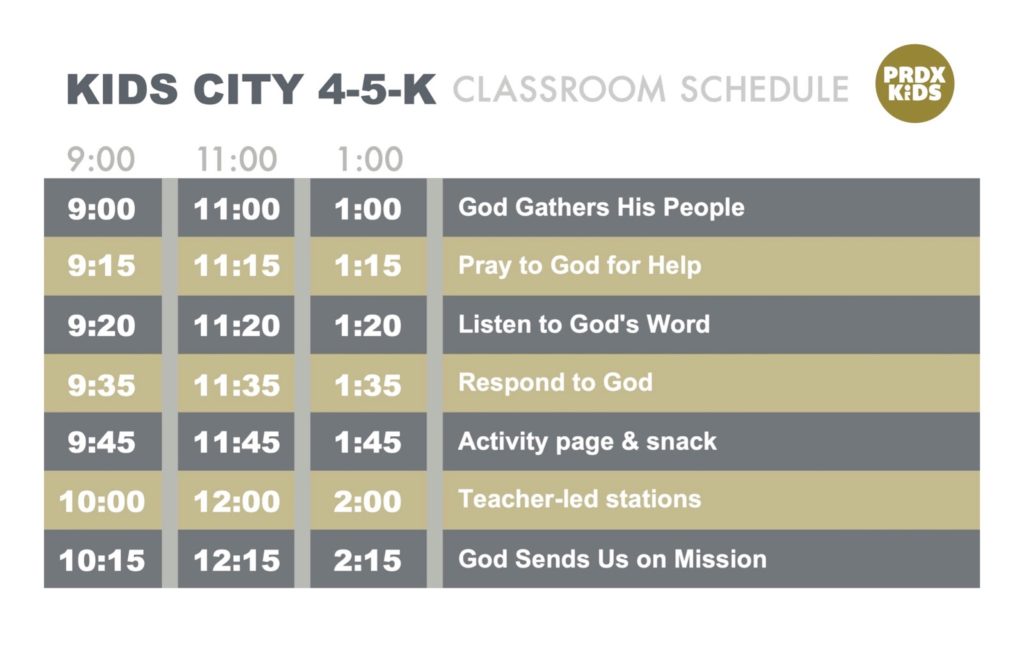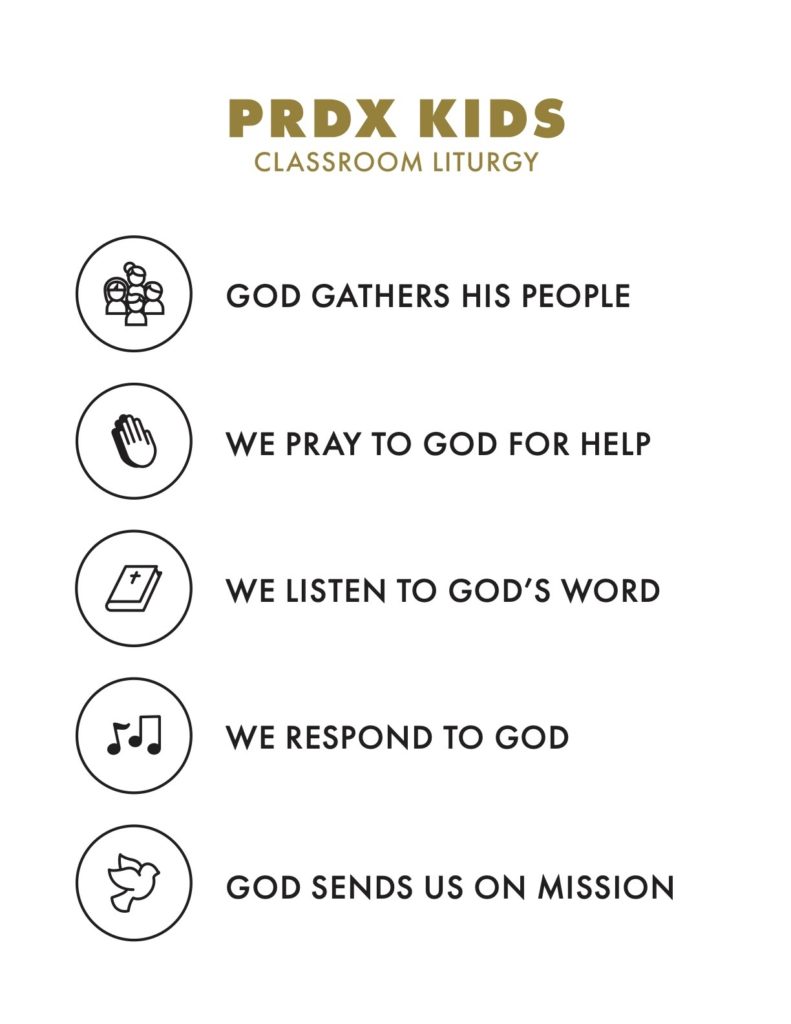I long wrestled with dissatisfaction around the schedule for each of our children’s ministry classrooms. Don’t get me wrong. My Type A personality loved the down-to-the-minute schedules handed to each lead teacher, and I felt a sense of success when things ran on time. Grasping to the slightest amount of order in a classroom of 3-year-olds felt like a win on a Sunday.
But my heart began to stir for our children and team members to make their way through an order of service that carried deep, theological purpose. I began to dream of making the moments we had with our children more aligned with the service their parents attended. From that desire was born our Paradox Kids classroom liturgy.
Let me explain the basics of this classroom liturgy, and then I’ll walk you through how we train the volunteers at Paradox Church to use it. The word liturgy means “the work of the people.” The order of service we repeat as adults on Sunday morning is our work of service rendered unto God. And simply put, liturgy is the rhythms and patterns we rehearse every week as we gather for worship with God’s people. Even our youngest children can be invited to participate in liturgy rather than sitting back to observe or be entertained. The work we invite them to participate in — individual pieces of our classroom liturgy serve as habits and practices that shape their hearts to love and know Jesus.
We keep our children’s liturgy simple so that children will know the glory and grace of Jesus throughout our classroom time and their lives: we invite children in, preach the gospel, give room for response, and then send our littles out on mission. The five liturgical movements of the classroom liturgy are as follows:
- God Gathers His People
- We Pray to God for Help
- We Listen to God’s Word
- We Respond to God
- God Sends Us on Mission
This language gives our team members a vision to lead in the classroom, not merely serve as babysitters. By identifying the flow of our classroom environments with the flow of a worship service — God initiating and people responding — every volunteer can see how they fit into the work God is doing in our children’s hearts.
Here is how it works. We have a poster on the classroom wall with the schedule/liturgy. Classroom time is broken down by minutes so that volunteers and children know what is coming next. Here is how each section of the schedule works.
God gathers his people
God loves to be with his people.Throughout the Scriptures we see God pursuing his people. He gathered his people to the tabernacle and later to the Temple. He established festivals and sacrifices that called his people together to meet with him. Now God’s church gathers on Sundays because God dwells with and among us.

We remind our children’s ministry team members that it is God who brings families each Sunday. We greet them with kind eyes, soft smiles, and welcome children into the classrooms warmly as Jesus gathered children around him — saying each child’s name and getting on their level. As kids enter the classroom, they gather with their peers over a puzzle or coloring sheet, and we follow the Spirit in reminding kids about how God longs to dwell with his gathered children.
We pray to God for help
If you’re familiar with The New City Catechism, you may know that one of the questions is, “What is prayer?” The answer to the question is, “Prayer is pouring out our hearts to God.” This language communicates to kids that we can trust God. What a beautiful habit for our children to be taught. When they have a need, when they are suffering, when they are grateful, when they find joy outside of God, they can come and pour out their hearts to their Good Father.
I want every child in our ministry to stand in awe of God and his power and his might. I want them to tell stories of the God who is so close that he hears our every prayer, so mighty that he can part the Red Sea. We don’t shut down children’s prayer requests, knowing that what might seem silly to an adult is precious to Jesus. We train our teachers not to hinder the children in their classrooms by making prayer eloquent or fancy or by merely dictating the content of their requests. But rather to believe that God hears both our silly requests and our suffering requests. It is the pouring out of our hearts that matters.
We listen to God’s Word
The third movement in our classroom liturgy is the most central. When we gather as a congregation, we read the scriptures and hear them taught through the sermon. In the case of children’s ministry, the teacher’s “congregation” is made up of young children who were created by God to know and love his Word.
As Haylee Bowden, our current Paradox Kids Director, and I worked on training materials for the team, she wrote these words about this part of our liturgy:
“Each week as you lead our kids to listen to God’s word, you are not leading them to listen to a historical story or learn helpful life lessons. You are leading them to commune with the God who made them, loves them, and desires to be in relationship with them. When we believe that God’s Word is true, alive, and that it changes us, we can freely lead children to listen to God’s Word. We don’t have to carry the weighty responsibility of changing kids’ hearts. We get to rely on the true, alive, and transforming Word of God to do that. May that truth free us to delight in leading our kids to simply, yet profoundly, listen to the words of our Maker.”
We respond to God
As we — both adults and kids — listen to God’s Word, it changes us. It evokes a response in us. Have you thought about how you respond when God’s Word is read or taught to you? We stand in awe of God, or we’re convicted by his Word and we respond by repenting, bursting forth in song, or rejoicing as we take communion. What if in the flow of our classroom schedules, we made room for a response from our children?

Giving kids an opportunity to respond involves more than doing a craft or pulling out a bag of blocks to entertain kids during the last minutes of class — though those activities could be a part of the response time that reinforces the teaching.
The goal of the response is for children to wrestle with the truths they have heard. When we confront the reality that we are sinners who need the grace that only Jesus can provide, this reality chips away at hardened and dead hearts so that we are led to burst forth in joy. So most often during the response movement, we invite kids to sing and confess their sins.
God sends us on Mission
Our classroom liturgy concludes with an emphasis on how God sends his people on mission. Our children are called to be “the salt of the earth” and “the light of the world” (Matt. 5:13, 14). Jesus commanded his disciples, “Go therefore and make disciples of all nations.” (Matt. 28:19). Children can learn about the importance of God’s mission even as God is calling them to salvation!
As class time is wrapping up, we prompt kids to hold out their hands and receive the blessing of God’s Word read over them. (The Great Commission is a good place to start!) Some of our teachers have put to memory a phrase like: “God is with you all week, and we can’t wait to see you again next week!”
We train our team to see this as a powerful spiritual moment, and we give them a vision for being faithful teachers up to the last minute of class time. The spoken blessing and “sending” lets a parent hear at pick-up time how we see their child as valuable and important in God’s kingdom.
This classroom liturgy is what we use to train our team members. We pray that its simplicity and richness will sow a love for Christ’s church in our littlest people that will bear fruit for decades to come. We also believe that the children’s liturgy trains our team members’ hearts. It shows each teacher how they can model to children their dependence on God through prayer, listening, and singing to God in grateful worship.
May the children in your classrooms be transformed by the Word of God. May God pour out his love for his people in a way that forms our children in the gospel and gives them a firm foundation for a lifetime of faithfulness. Amen.
